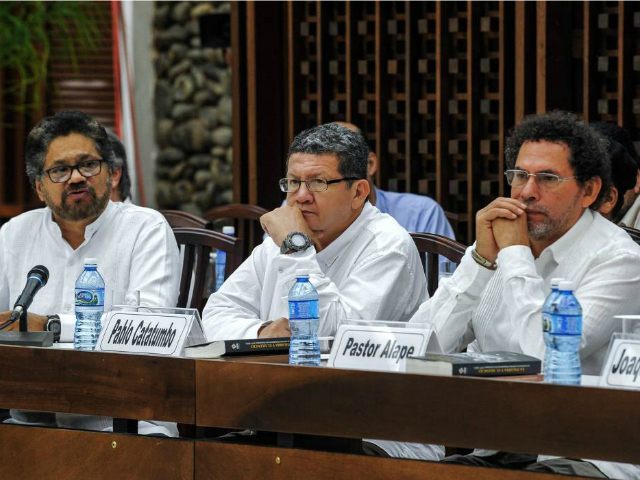Revolutionary Armed Forces of Colombia (FARC) negotiators have dismissed a March deadline for peace talks with the Colombian government as “naive,” as the terrorist organization demands more concessions from a government looking to end terrorist violence through dialogue.
“Insisting on the 23rd of March as a deadline for dialogue, after the delays that have occurred, is naive and lightweight,” Iván Márquez, the head negotiator for the Marxist terror group, tweeted this week. Joaquín Gómez, another member of the FARC negotiating group, echoed his sentiments. “We are doing the impossible, but there are causes or objective facts that will surely impede that this will happen on the 23rd… there are very important pitfalls, such as the clarification and dismantling of our paramilitary.”
As Argentine news outlet Infobae notes, these remarks directly contradict Colombian President Juan Manuel Santos, who said last week that the government’s negotiators have “very clear instructions: hit the accelerator on the process so that we can end this armed conflict as soon as possible, which has done so much harm to our country.”
The FARC is the world’s wealthiest non-jihadist terrorist organization; only the Islamic State and Hamas boast fuller coffers. It has killed an estimated 220,000 people in its 50-year history. 11,000 people are believed to have been killed in the past 15 years. These estimates do not include people killed through forced abortions, which were standard operating procedure for female child soldiers. The man believed to be the FARC’s deadliest abortion doctor is responsible for an estimated 500 abortions.
FARC negotiators have been threatening to abandon the peace process for months. In October, shortly after President Santos announced before the United Nations that the peace talks had been fruitful, a FARC spokesman threatened that the group would leave negotiations “if the government begins to question the agreements already signed and make us regress on what has already been advanced on.”
Possibly in response to the negative press their latest statements have received, the FARC released an official statement on Thursday claiming that “our optimism is great” for a full resolution to the peace talks. “Our goal is to… configure a full process of democratization of national life,” the statement claimed.
In his State of the Union address Tuesday, President Obama appeared to take some credit for the peace talks between the terrorist group and the Colombian government for the United States. “When we help Ukraine defend its democracy, or Colombia resolve a decades-long war, that strengthens the international order we depend upon,” he told the assembled. The United States has had a minimal role in the endeavor, however. The country mediating the talks is the rogue communist state of Cuba, which illegally harbors the FARC leadership that survived a joint CIA-Colombian military counterterrorism effort left by former presidents Álvaro Uribe and George W. Bush in the mid-2000s.
Colombian officials landed in Cuba Tuesday to resume peace talks. As it stands, the peace deal would result in the creation of a special tribunal for FARC criminals, who are to be tried for either “political crimes” or “crimes against humanity.” FARC terrorists would receive 60 days, beginning on March 23, to hand over their weapons and surrender to the tribunal. Those who do and are found guilty of political crimes will not necessarily have to serve time in prison, performing community service instead. Negotiators have not yet agreed on whether crimes related to drug trafficking—including abduction, recruitment of child soldiers, placing land mines, and global trade in cocaine and marijuana—will be tried as political crimes or crimes against humanity.

COMMENTS
Please let us know if you're having issues with commenting.